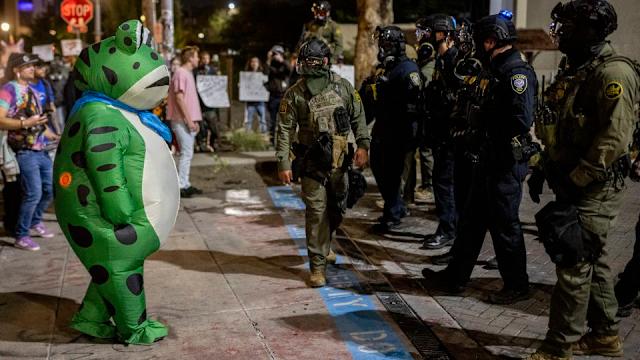Commemorating Sexual Assault Awareness Month
Individuals in local and broader communities are impacted
April 13, 2022
The month of April marks nationally recognized Sexual Assault Awareness Month – meant to highlight a prevalent issue that individuals face not just in the Gannon University community, but in the local, national and international communities.
According to RAINN (Rape, Abuse, Incest National Network), sexual assault on college campuses is pervasive – with 13% of all students experiencing rape or sexual assault through physical force, violence or incapacitation. Male college-aged students are 78% more likely than non-students of the same age group to be a victim of rape or sexual assault, while female college-aged students are 20% more likely than non-students of the same age group to be a victim of rape or sexual assault.
Sue Majocka, director of Student Accountability and Title IX Student Development and Engagement at Gannon, said that the college-aged population is at a higher risk because of risk-taking behaviors.
“The 18-24 age period is a time of growth and exploration for many young adults,” Majocka said. “It is a time of vast development and is a period where many young adults tend to meet more people, make independent decisions and try new things. This is an age where risk-taking occurs, which is a part of growth and development.”
Despite the prominence of sexual assault, it can be difficult to punish or prosecute perpetrators, Julia Mack, Ph.D., director of the criminal justice program at Gannon, said. Only a percentage of sexual assaults are reported to the police – in 2018, only 20-25% of sexual assaults were reported to law enforcement.
“Survivors are weary of reporting their assault to the police because they worry about retaliation, not just from the perpetrator but from society as a whole,” Mack said.
Mack said that victims are often retaliated against like Christine Blasey Ford was in the Brett Kavanaugh Supreme Court confirmation hearing.
“She experienced victim blaming, victim and event denial and even received death threats from the public,” Mack said. “Observing that experience alone would likely deter someone from reporting their victimization.”
There are often other elements of the situation, like events leading up to the assault, details recalled during the investigation, evidence and witness testimony – or lack thereof.
“In most cases, survivors know the perpetrators; they may be friends, acquaintances or even have been on a date prior to when the assault occurred,” Mack said. “In such cases, there tend to be no witnesses, which then results in a ‘he said/she said’ scenario, especially if there is no physical evidence present, which causes the incident to be much more difficult to prosecute.”
Being victimized can also impact someone’s ability to accurately recall certain details, like the chronological order of events.
“When follow-up interviews occur, the survivor may remember additional details or revise information that was presented during the initial interview, something that often happens with people who experience trauma,” Mack said.
“When traumatic events occur, our brain may repress portions of the event or the memories may be fragmented, which impacts a survivor’s ability to fully describe the minute details of the event, information that is crucial in the prosecutorial process. When physical evidence and/or witnesses aren’t present, prosecutors only have the testimony from the offender and victim’s memory, which can be fallible even when the trauma hasn’t been experienced.”
Mack said that in theory, victims should feel protected by the criminal justice system.
“The criminal justice system exists as an investigative body to identify, convict and punish offenders, while protecting the public,” Mack said. “Their focus is on the offender to enhance and maintain safety within the community, while the victim’s role is to provide evidence and testimony against the offender.”
Some jurisdictions may have officers and attorneys who are specially trained in sex crimes and in trauma-informed care, which can help the interview process and ultimately the victim. However, this is not always the case.
“Given the re-traumatization that often happens with victims of crimes, I believe that all sectors of the criminal justice system – from 911 operators to the judicial system – should be trained on the impact of trauma and how to best implement trauma-informed care,” Mack said. “While some police departments may not have to capacity to provide direct support to the victim, they will let the individual know of resources in the community that can help with the court and healing process. For instance, in Erie, both the Crime Victim Center and SafeNet provide support for victims, not just through counseling but also to serve as a court advocate and hospital accompaniment, so the victim isn’t alone while going through the process.”
However, many cases of sexual assault that occur in college go through the school rather than the criminal justice system. This is largely a result of Title IX, which requires schools to manage cases of sexual discrimination, including sexual harassment and assault.
“The university serves as a way to give survivors additional rights beyond the criminal justice process,” Mack said. “Students are able to report an assault to both the school and the criminal justice system, but understanding that each organization has different goals when an incident is reported.”
A university tends to take a more comprehensive approach, which identifies resources for both the victim and the offender. In contrast, the role of law enforcement is to punish the perpetrator. Mack said that this route does not take into account the discriminatory impact of the sexual assault.
“The bar to convict a perpetrator is extremely high due to complexity of the case and the interviewing and evidence collection process can be retraumatizing for the victim,” Mack said. “Rather than going through the drawn-out criminal justice process, some survivors may just want to ensure they have no contact with the offender, which is an accommodation the university can provide.”
Majocka said that Gannon strives to create a culture of reporting when it comes to sexual assault. When an incident is reported, the university is able to reach out to the individual affected and offer supportive measures such as mental health and medical resources and information regarding local agencies that can provide assistance and support, and explain resolution options.
Some faculty members immerse helpful information and resources into curriculum, such as bystander behavior implementation in a criminal justice or psychology course or initiating conversations about gender stereotypes in philosophy or theology courses.
Gannon also has a comprehensive education program for incoming students, which includes an online program, Step Up bystander education, presentations in first year seminar courses and guest presentations and speakers.
Being a victim of any crime, particularly during childhood or adolescence, can be a very traumatic experience. Traumatic experiences such as sexual assault can have long-lasting, negative impacts on an individual’s psychological well-being, including self-worth and the ability to trust others.
“For some, reporting an assault or crime to law enforcement can lead to re-traumatization, due to the victims/survivor’s heightened vulnerability after the event occurred,” Mack said. “When someone reports a sexual assault to the authorities, the interview questions and medical examination can feel extremely intrusive.
“While these details are extremely valuable when investigating the case, having to relive the traumatic event over and over can be an overwhelming experience. This is why organizations such as the Crime Victim Center exist, to support survivors as they navigate the criminal justice process.”
Majocka also said that sexual assault impacts each individual differently, but it can have tremendous physical and emotional impacts, such as trouble focusing, depression, anxiety, sexually transmitted diseases, trouble sleeping and academic withdrawal.
Sexual violence goes beyond sexual assault and includes things like stalking, dating violence and sexual harassment, Majocka said.
“Creating conversations around the larger picture is important – teaching the campus community to recognize healthy and unhealthy relationships and creating a culture of human dignity and respect for all by virtue of their humanity,” Majocka said.
“The community needs to be able to engage in the conversations of respect, learning to actively listen to one another, and at times to confront members of the community who are not showing displays of respect.”
ANNA MALESIEWSKI





